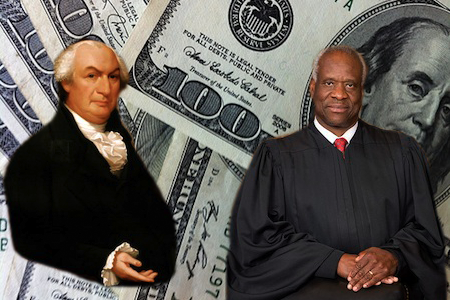Campaign Finances and Original Intent

Left to right: Gouverneur Morris, Clarence Thomas. Credit: Flickr/Wikimedia Commons/HNN staff.
The founders saw it coming.
“The rich will take advantage of their [the people’s] passions & make these the instruments for oppressing them,” Gouverneur Morris fretted at the Constitutional Convention. Morris, who spoke more often than any other delegate and who penned the final draft of the Constitution, knew a thing or two about aristocracy and the ways of the rich. His father was Lord of the Manor of Morrisania, the present-day Bronx.
John Adams, like Morris, predicted that democracy would revert to aristocracy once some men commanded the votes of others. “By an aristocrat,” he wrote, “I mean any man who can command or influence two votes, one besides his own.” (His emphases.) To wield undue influence in a democracy, Adams’s “aristocrat” did not require “artificial titles, tinsel decorations of stars, garters, ribbons, golden eagles and golden fleeces.” He could depend instead on “his face, figure, eloquence, grace, air, attitude, movements, wealth, birth, art, address” or even, most insidiously, by his “intrigue, drunkenness, debauchery, fraud, perjury, violence, treachery.” By the time Adams wrote these words in 1814, he knew a thing or two about politics, having engaged Thomas Jefferson in two pitched battles for the presidency.
Morris and Adams were not alone in fearing that wealth and airs or intrigue and fraud endangered republican values. In the government they were designing, all founders hoped that people would cast their votes free of the coercive demands of others, and equally unhindered, elected officials would speak to the people’s true interests. Envisioning the future, however, founders saw the system could falter if a representative, senator, president, or public official owed his election to a person or group financing his campaign, effectively buying his allegiance. That was an invitation to corruption, and delegates did what they could to guard against it -- even if they sensed they could not absolutely prevent it. Purposely, they demanded that presidential electors meet simultaneously in their separate states, hoping this would somehow immunize them against undue influence or outright corruption.
If the founders were evidently wary of such influence, why didn’t Justices Scalia, Thomas, Alito, Kennedy, and Roberts, in deciding Citizens United, follow their lead?
“Unless interpretive methodologies are tied to the original intent of the framers, they have no more basis in the Constitution than the latest football scores,” Justice Thomas told his audience at the Manhattan Institute four years ago. The meaning of the Constitution must be “rooted in the moral perceptions of the time,” Scalia pronounced in his book, A Matter of Interpretation. Yet the original intent of the founders -- their moral perception -- was clearly to create a government as devoid of outside influence as possible. And where, exactly, did the founders declare that money is speech and corporations are people, the underpinnings of Citizens United? These are clearly latter-day constructions, precisely what self-professed originalists claim to detest. Today’s conservative justices cast blind eyes to the founders overarching fear that private influence could and would destroy the republic.
In this election, the people will choose not only the president but also the future Supreme Court. A savvy public knows this when discussing Roe v. Wade, but what about overturning Citizens United, with all its insidious effects? We see in this election what the founders predicted but the conservative majority on the High Court has conveniently ignored: two billion dollars meant to influence voters and thereby control government. And it won’t stop there. Soon it will be tens of billions, if that’s what it takes to command the votes of others. Only the super rich will be able to ante-up for those high-stakes games.
The current election is a meta-election about all future elections. With additional non-originalist “originalists” like Justices Scalia and Thomas appointed to the court, Citizens United will not only stand but be reinforced. The retreat from republican government will be finalized, the highest hopes of the founders thwarted. This is the elephant in the room.
